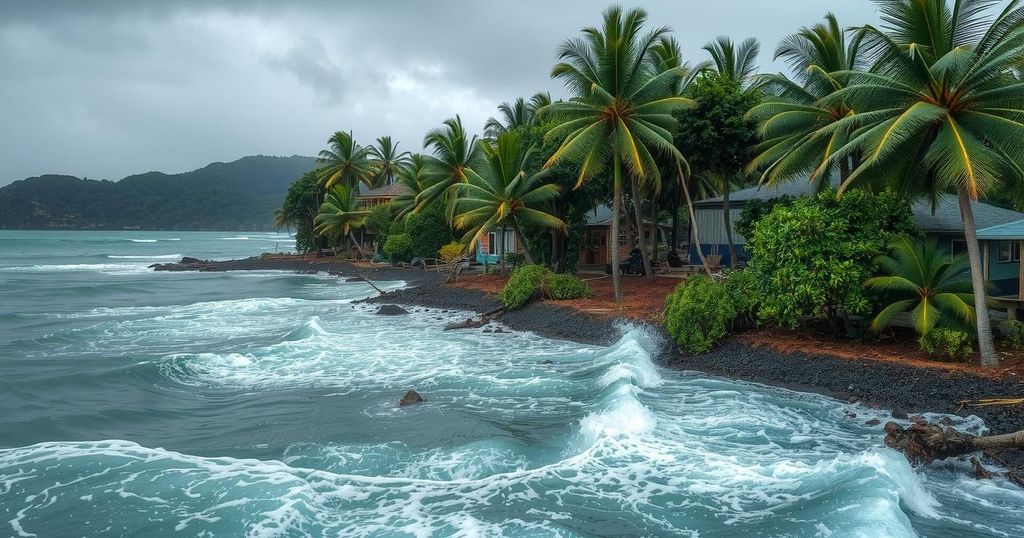Tropical Storm Dikeledi has hit Mayotte, complicating recovery efforts from Cyclone Chido’s aftermath. Residents are sheltering indoors under a red alert as heavy rains and winds threaten ongoing rebuilding. The region struggles with socio-economic challenges, highlighting urgent needs for international aid and disaster management strategies to help mitigate future climate risks.
On January 13, 2025, Tropical Storm Dikeledi struck the French territory of Mayotte, exacerbating the region’s vulnerabilities following the devastating impact of Cyclone Chido the previous December. With a red alert issued, residents are urged to remain indoors amid heavy rains and strong winds, severely hampering the territory’s ongoing recovery efforts. Cyclone Chido, regarded as the worst storm in nearly a century, left significant destruction in its path, resulting in at least 39 fatalities and thousands injured.
Mayotte, often highlighted as France’s poorest department, faces significant challenges with its infrastructure and disaster preparedness, underscoring the urgent need for systematic responses to its frequent tropical weather events. The government has triggered emergency protocols, promoting stockpiling of essential supplies while local officials and aid organizations endeavor to assist impacted areas.
International aid aims to play a critical role in recovery; however, logistical deficiencies in communication and transportation complicate resource delivery to the isolated island. The frequent occurrence of such storms has intensified discussions surrounding the vulnerability of small island states in the context of climate change, as Mayotte illustrates the rising threats posed by increasingly severe tropical storms linked to climate dynamics.
Moreover, the socio-economic realities of Mayotte hinder effective recovery, with high unemployment rates and limited healthcare services compounding the effects of natural disasters. The dual calamities of Cyclone Chido and Tropical Storm Dikeledi necessitate immediate humanitarian responses alongside a strategic focus on long-term resilience to mitigate future risks.
The article addresses the impacts of Tropical Storm Dikeledi on the French territory of Mayotte, a small archipelago in the Indian Ocean. It traces the hardships the region faces following Cyclone Chido, which caused major destruction just a month prior. Mayotte is characterized as France’s least affluent department, which exposes it to severe vulnerabilities during natural disasters. Recurrent storms emphasize the socio-economic challenges and the urgent need for effective disaster management strategies as climate change threatens small island territories.
The dual impacts of Cyclone Chido and Tropical Storm Dikeledi highlight the urgent need for enhanced climate resilience measures and support from the international community. As Mayotte copes with these consecutive disasters, it must address both immediate humanitarian needs and long-term infrastructural improvements to protect its vulnerable population. The situation calls for collaborative efforts to combat the growing challenges posed by climate change, ensuring better preparedness for future storms.
Original Source: www.travelandtourworld.com






